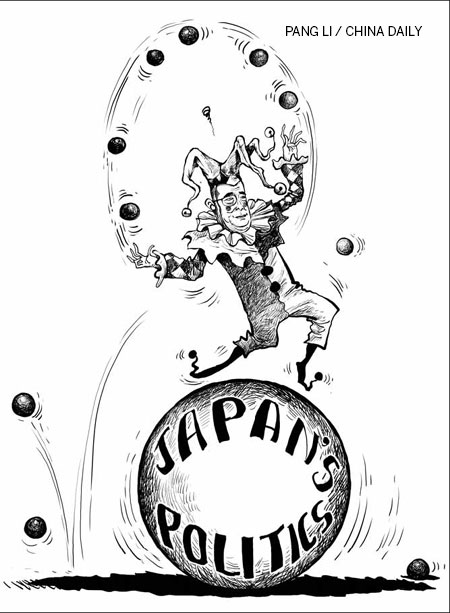
Over the weekend, Shintaro Ishihara, the governor of Tokyo, announced that he would advertize his campaign to "purchase" China's Diaoyu Islands in the New York Times.
Since the right-wing politician announced in April that his city prefecture was negotiating with the Japanese "owner" of the Diaoyu Islands in the hope of "buying them by the end of this year", he has collected 1.3 billion Japanese yen ($16.34 million) for his campaign.
With his ridiculous campaign, Ishihara has attempted to take advantage of anti-China sentiment in Japan to boost his political reputation and solicit more support. He said he planned to form his new party.
In so doing, Ishihara is obviously promoting Japanese "ownership" of the islands. Japan calls the islands which it illegally annexed from China, its "inherent territory". It even stubbornly claims that there is no dispute over its sovereignty. This stance has been widely upheld in Japanese textbooks and the Japanese media and seriously misled Japanese public opinion about the ownership of the Diaoyu Islands. The historical and legal evidence proves that the Diaoyu Islands have been China's territory since ancient times.
Actually Ishihara is just trying to stand out in the domestic political struggle by making use of China and Japan's territorial dispute over the Diaoyu Islands. Ishihara's farce has created trouble for the ruling Democratic Party of Japan, which is not adept at diplomacy and embattled at home.
On Monday the DPJ's Ichiro Ozawa and his supporters resigned from the party in protest at a sales tax hike. Ozawa is known as the "shadow shogun" because of the considerable power and influence he wields behind the scenes. Ozawa said he would form a new party, which might be a heavy blow to the Japanese Prime Minister Yoshihiko Noda and may lead to a lower house election this summer.
The consumption tax bill that would double the rate to 10 percent by 2015, which was submitted to the House of Representatives by Noda's cabinet, has already divided the DPJ. And the party has been heavily criticized for its handling of the Fukushima Daiichi nuclear crisis and Japan's battered economy following the earthquake and tsunami in March 2011. So if a lower house election is held, it's hard to say whether the DPJ will stay in power.
Ishihara sees the changing political landscape in Japan as a chance to make political gains. It is now much more difficult to find major differences between the two major political parties and Ishihara is seeking to push himself to the forefront of Japanese politics with his shenanigans.
As a notorious representative of Japan's right-wing, Ishihara has issued irresponsible remarks about Sino-Japanese relations on many occasions. But his campaign to "buy" the Diaoyu Islands threatens to hijack Japan's diplomacy toward China and is casting a shadow over bilateral ties.
However, while winning support from extremist Japanese politicians, Ishihara's provocative campaign has also encountered opposition from more sensible Japanese politicians. Uichiro Niwa, Japanese ambassador to China, warned that the implementation of Ishihara's plan will result in a profound crisis in Sino-Japanese relations. He said Japanese government should not allow decades of efforts to improve ties between the two countries be ruined because of Ishihara's political ambitions.
But despite the fact that the China-friendly forces in Japan are being marginalized, we should also not be excessively pessimistic about the prospects for Sino-Japanese ties. The growing interdependence between the two countries means Japan will return to a rational stance in its dealings with China at some point.
With the continuous rise of China's economic power since the start of the 21st century, East Asia has witnessed a never-before-seen era in which China and Japan are both big powers in the region.
Both countries should looked at the other's economic and social development in a rational way and defuse mutual structural contradictions to forge a "strategically reciprocal" harmonious relationship.
Politicians from both countries should strive to handle the Diaoyu Islands dispute more cautiously when the two countries celebrate the 40th anniversary of the normalization of bilateral diplomatic ties.
The author is a researcher with the Institute of Japan Studies, under the Tianjin-based Nankai University.
(China Daily 07/05/2012 page9)